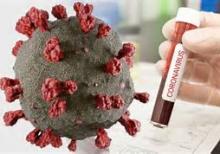Covid-19 antibodies fall rapidly after infection
Levels of protective antibodies in people wane "quite rapidly" after coronavirus infection, say researchers.
Antibodies are a key part of our immune defences and stop the virus from getting inside the body's cells.
The Imperial College London team found the number of people testing positive for antibodies has fallen by 26% between June and September.
They say immunity appears to be fading and there is a risk of catching the virus multiple times.
More than 350,000 people in England have taken an antibody test as part of the REACT-2 study so far.
In the first round of testing, at the end of June and the beginning of July, about 60 in 1,000 people had detectable antibodies.
But in the latest set of tests, in September, only 44 per 1,000 people were positive.
It suggests the number of people with antibodies fell by more than a quarter between summer and autumn.
"Immunity is waning quite rapidly, we're only three months after our first [round of tests] and we're already showing a 26% decline in antibodies," said Prof Helen Ward, one of the researchers.
The fall was greater in those over 65, compared with younger age groups, and in those without symptoms compared with those with full-blown Covid-19.
The number of healthcare workers with antibodies remained relatively high, which the researchers suggest may be due to regular exposure to the virus.
Antibodies stick to the surface of the coronavirus to stop it invading our body's cells, and attract the rest of the immune system.
Exactly what the antibody drop means for immunity is still uncertain. There are other parts of the immune system, such as T-cells, which may also play a role.
However, the researchers warn antibodies tend to be highly predictive of who is protected.
Prof Wendy Barclay said: "We can see the antibodies and we can see them declining and we know antibodies on their own are quite protective.
- Read more about Covid-19 antibodies fall rapidly after infection
- Log in or register to post comments

